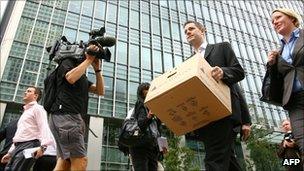Company profits defy economic gloom
- Published

Oil giants such as Shell have seen their profits soar
You've seen all the headlines - Fears grow about eurozone debt, Growth slower than anticipated, Turmoil on the financial markets.
So it's all tales of doom and gloom, right?
Not necessarily. At least not if you happen to be a big company.
Despite all the concerns about the world economy, many corporations have still been recording large profits which, on the whole, have been much better than analysts had forecast.
Apple made a record profit of $7.31bn (£4.6bn) in the three months to 25 June, 125% higher than a year earlier.
Oil giants BP, Shell and Exxon Mobil have all seen higher earnings this year.
Even Toyota, although it has suffered from the impact of Japan's earthquake and tsunami, has generally been seen as recovering faster than expected, and has raised its full-year profit forecast.
So why are companies doing so well, given the economic backdrop?
'Lean and mean'
"The main reason is during the financial crisis of 2008-09 companies moved very quickly and aggressively to cut their costs and to keep things down to a minimum," says Richard Hunter, head of equities at Hargreaves Lansdown stockbrokers in London.

Since the collapse of Lehman Brothers in 2008, corporations have downsized aggressively
"What started happening around 2010 was, even though the top-line growth wasn't happening to a great extent, the fact they were so lean and mean meant they were still profitable. That then fed through to the end of 2010 and this year."
Brian Barish, president of Cambiar Investors in Colorado, adds: "The impact of modern software and computer systems to manage supply chains and so on is far better than it's ever been.
"And companies have avoided very conspicuously any kind of inventory bulge."
Tech innovators
One industry that stands out is the technology sector, with giants such as Google, Microsoft and Apple all continuing to report big numbers.
But within the sector, there are fields that are doing better than others, and experts say it is only those who innovate that are seeing booming results.

Apple's push into the tablet market was seen as a smart and timely move
"Apple's always been one step ahead," says Daniel Ashdown, research analyst at Juniper Research, pointing to its move into the tablet market with the iPad as "an incredible success".
"It's such a new high-growth sector, compared to the laptop market which had been around for a long time and has been hit more by the economic downturn," he says.
"The tablet market is targeting a demographic perhaps with a higher income, whereas a lot of laptops were bought by enterprise and they've cut costs."
Bank fears
While technology companies may be leading the way, they are by no means the only ones seeing large returns.
Oil firms have been benefiting from higher oil prices, a pick-up in demand has helped car and plane makers, while supermarket giants continue to see strong results, with Tesco, for instance, buoyed by growth in Asia.
However, the one area that is currently the biggest cause for concern for investors is the state of European banks.
Amid rumours that bank balance sheets may not be as strong as they are made out to be, and worries about their level of exposure to Greek debt, it seems to be a case of "what you don't know" that is spooking investors.
But Brian Barish is confident that banks will emerge stronger.
"This is about banks that are sitting on sovereign bonds. They didn't do anything wrong.
"People are just worried about the credibility of the governments they're attached to."
Ready to invest?
So despite the stuttering economic recovery, how likely is it that companies will see their earnings improve further?
To some extent, it will depend on whether they start spending the cash that they've built up on their balance sheets over the past couple of years through cutting costs and improving profitability.
Apple, for instance, revealed in its latest financial results that it holds an enormous $76bn cash in reserve.
"Companies are not quite yet prepared to invest that money directly in technology or taking on new staff," says Richard Hunter.
Instead, there has been an increase in dividend payouts to shareholders and a rise in firms buying back their own shares - a move which reduces the number of shares in issue, meaning there are fewer pieces of the company, which then attract a bigger share of any profits.
But fears about the economy are never far from people's minds, Mr Hunter says, and the state of the economy is likely to have an impact on a lot of companies.
But he adds that some who are doing very well have diversified into other markets such as India and China leaving room for potential growth there.
Brian Barish also believes the current level of profitability could go on for a while
"There are logical limits to the percentage of profits corporations can make in relation to GDP, but I can see a situation for a few years where you see sluggish growth but you do have some very strong corporate profitability in there," he says.
"Companies are being very efficient, very cautious and by and large the cost of labour - wages and benefits - is not too demanding for them."
- Published29 July 2011